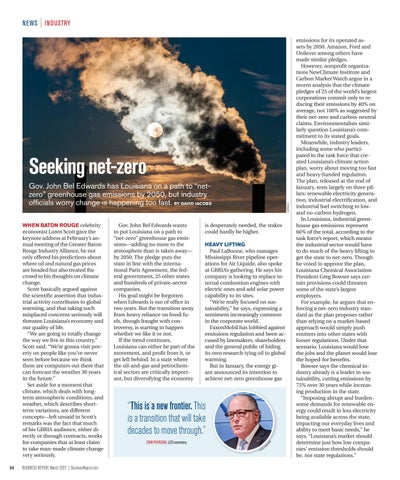NEWS
INDUSTRY
Seeking net-zero
54
Gov. John Bel Edwards wants to put Louisiana on a path to “net-zero” greenhouse gas emissions—adding no more to the atmosphere than is taken away— by 2050. The pledge puts the state in line with the international Paris Agreement, the federal government, 25 other states and hundreds of private-sector companies. His goal might be forgotten when Edwards is out of office in two years. But the transition away from heavy reliance on fossil fuels, though fraught with controversy, is starting to happen whether we like it or not. If the trend continues, Louisiana can either be part of the movement, and profit from it, or get left behind. In a state where the oil-and-gas and petrochemical sectors are critically important, but diversifying the economy
is desperately needed, the stakes could hardly be higher. HEAVY LIFTING Paul LaBonne, who manages Mississippi River pipeline operations for Air Liquide, also spoke at GBRIA’s gathering. He says his company is looking to replace internal combustion engines with electric ones and add solar power capability to its sites. “We’re really focused on sustainability,” he says, expressing a sentiment increasingly common in the corporate world. ExxonMobil has lobbied against emissions regulation and been accused by lawmakers, shareholders and the general public of hiding its own research tying oil to global warming. But in January, the energy giant announced its intention to achieve net-zero greenhouse gas
“This is a new frontier. This is a transition that will take decades to move through.” R
DON PIERSON, LED secretary
D AI
WHEN BATON ROUGE celebrity economist Loren Scott gave the keynote address at February’s annual meeting of the Greater Baton Rouge Industry Alliance, he not only offered his predictions about where oil and natural gas prices are headed but also treated the crowd to his thoughts on climate change. Scott basically argued against the scientific assertion that industrial activity contributes to global warming, and that taking such misplaced concerns seriously will threaten Louisiana’s economy and our quality of life. “We are going to totally change the way we live in this country,” Scott said. “We’re gonna visit poverty on people like you’ve never seen before because we think there are computers out there that can forecast the weather 30 years in the future.” Set aside for a moment that climate, which deals with longterm atmospheric conditions, and weather, which describes shortterm variations, are different concepts—left unsaid in Scott’s remarks was the fact that much of his GBRIA audience, either directly or through contracts, works for companies that at least claim to take man-made climate change very seriously.
ISTOCK
Gov. John Bel Edwards has Louisiana on a path to “netzero” greenhouse gas emissions by 2050, but industry officials worry change is happening too fast. BY DAVID JACOBS
DO
N
KA
emissions for its operated assets by 2050. Amazon, Ford and Unilever among others have made similar pledges. However, nonprofit organizations NewClimate Institute and Carbon Market Watch argue in a recent analysis that the climate pledges of 25 of the world’s largest corporations commit only to reducing their emissions by 40% on average, not 100% as suggested by their net-zero and carbon-neutral claims. Environmentalists similarly question Louisiana’s commitment to its stated goals. Meanwhile, industry leaders, including some who participated in the task force that created Louisiana’s climate action plan, worry about moving too fast and heavy-handed regulation. The plan, released at the end of January, rests largely on three pillars: renewable electricity generation, industrial electrification, and industrial fuel switching to lowand no-carbon hydrogen. In Louisiana, industrial greenhouse gas emissions represent 66% of the total, according to the task force’s report, which means the industrial sector would have to do much of the heavy lifting to get the state to net-zero. Though he voted to approve the plan, Louisiana Chemical Association President Greg Bowser says certain provisions could threaten some of the state’s largest employers. For example, he argues that enforcing a net-zero industry standard as the plan proposes rather than relying on a market-based approach would simply push emitters into other states with looser regulations. Under that scenario, Louisiana would lose the jobs and the planet would lose the hoped-for benefits. Bowser says the chemical industry already is a leader in sustainability, cutting emissions by 75% over 30 years while increasing production in the state. “Imposing abrupt and burdensome demands for renewable energy could result in less electricity being available across the state, impacting our everyday lives and ability to meet basic needs,” he says. “Louisiana’s market should determine just how low companies’ emission thresholds should be, not state regulations.”
BUSINESS REPORT, March 2022 | BusinessReport.com
52-57 News Intro.indd 54
2/24/22 2:58 PM











